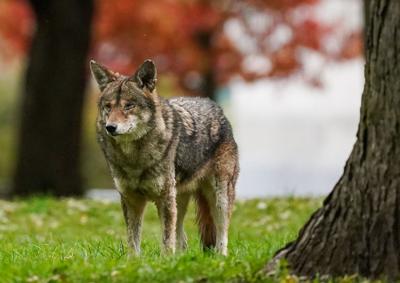There’s an old Jerry Seinfeld bit in which the comedian imagines what aliens would think of the relationship between humans and dogs.
Any beings from outer space who watched as we were led around by canines, picking up their poop in little bags and carrying it around, would assume, Seinfeld concludes, that the dogs are in charge.
The joke comes to mind whenever, as has been increasingly the case, there’s another story about coyotes intruding on urban neighbourhoods. Time after time, the response from authorities hasn’t been that coyotes are a threat to humans and should be dealt with but that people need to do a better job of not bothering wildlife.
Who, exactly, is in charge here?
ÎÚŃ»´«Ă˝ has been wrestling with that question in a serious way ever since two coyotes were culled in May, after it was determined that they’d likely killed household pets in Liberty Village. A city committee was scheduled on Wednesday to discuss the possibility of creating a wildlife response team that would, in part, deal with the increase in coyote-related complaints.
And ÎÚŃ»´«Ă˝ isn’t the only urban area to have experienced a rise in coyote incidents. In Vancouver, after a rash of coyote attacks in Stanley Park a few years ago, city officials closed the park overnight for a period, causing residents to wonder whether it had, in fact, been lost to the coyotes (which, in the end, were culled).
A recent study found that the surge in coyote encounters directly followed from pandemic-era restrictions that led to more people eating in parks — but cities throughout North America have also seen more encroachments on residential areas simply because of the availability of food, from small animals and human food waste.
In my neighbourhood in Markham, regular coyote sightings began a few years ago, when a group of them moved into a nearby ravine. Sometimes they could be heard howling at night, but it wasn’t uncommon to see them trotting along during the day, too, which naturally worried the residents whose homes included small children or smaller dogs.
The city responded by putting up a sign that basically told everyone to leave the coyotes alone. “Quiet please, coyote family living in the area,” it said. The sign, helpfully featuring a photo of four cute, small coyotes, warned residents against approaching or feeding the animals. This made sense. But it also said not to take photos of them. Are we respecting the coyotes’ privacy rights now?
One can be open-minded about the need to coexist with wildlife and glad that we’ve come a long way from the days when any animal sighting resulted in someone being dispatched with a varmint rifle but still wonder if we don’t have the balance quite right here.
Coyotes, after all, have not always been a regular sight in backyards and parks, steps away from where they can cause real harm to residents. A neighbour in Markham once called city officials to report that a large coyote had casually strolled up a driveway while someone was watering their garden and was told that this was just business as usual: the neighbourhood is the coyotes’ habitat, too. But is it? Or have we just let it become that?
That seems like the key question as ÎÚŃ»´«Ă˝ considers assembling some sort of coyote response team: Will its job include ensuring that there are fewer coyotes in residential areas, or will taxpayers be spending tens of thousands of dollars to be told to leave them alone?
The coyotes that dwelled in the ravine in my neighbourhood have, it seems, moved on. Either that, or they can’t be bothered to howl anymore. The big sign came down, at any rate. But it’s been replaced by a smaller, more permanent one that explains the presence of wildlife in the city and offers some helpful tips for residents.
Coyotes will generally keep to themselves, it says. But sometimes they won’t, and in those instances, residents should be careful. Among the suggestions: always walk with a friend. Don’t make it easy on the coyotes, in other words.
It’s a good thing the coyotes cannot read. They would no doubt be pleased by how welcoming we are.
Error! Sorry, there was an error processing your request.
There was a problem with the recaptcha. Please try again.
You may unsubscribe at any time. By signing up, you agree to our and . This site is protected by reCAPTCHA and the Google and apply.
Want more of the latest from us? Sign up for more at our newsletter page.































To join the conversation set a first and last name in your user profile.
Sign in or register for free to join the Conversation